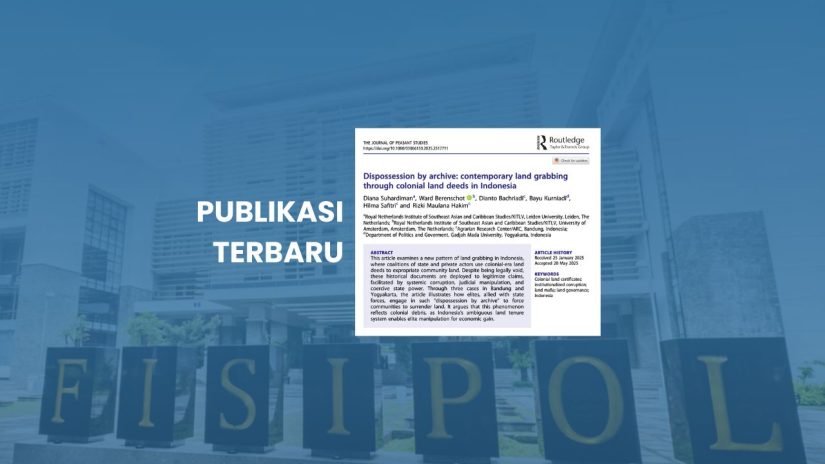
Bayu Dardias Kurniadi, lecturer at the Department of Politics and Government (DPP), Faculty of Social and Political Sciences (FISIPOL) Universitas Gadjah Mada, has achieved another academic milestone through his latest publication in the internationally renowned journal Journal of Peasant Studies (Routledge). The article, titled “Dispossession by Archive: Contemporary Land Grabbing Through Colonial Land Deeds in Indonesia,” was co-authored with Diana Suhardiman, Ward Berenschot, Dianto Bachriadi, Hilma Safitri, and Rizki Maulana Hakim.
The article examines how land grabbing in contemporary Indonesia is often mediated through the use of colonial-era land documents. The study shows how Dutch colonial land archives are being utilized as legal-formal instruments to legitimize claims over land—frequently at the expense of indigenous peoples and local communities who have lived on and managed these lands for generations.
What makes this study particularly compelling is its critical perspective on archives as instruments of power. Instead of serving as sources of justice, archives can be politicized to justify unequal agrarian practices. By combining historical, legal, and political approaches, the article enriches the discourse on land politics in Indonesia and highlights the deep entanglement between past colonial structures and contemporary struggles over land.
This publication underscores FISIPOL UGM’s important contribution to global scholarship on agrarian issues and social justice, while reaffirming the role of its faculty in international academic debates.
The full article can be accessed via the following link.
Relevant SDGs (Integrated in the Narrative)
This research directly resonates with several Sustainable Development Goals (SDGs):
-
SDG 1 – No Poverty: by exposing how land dispossession perpetuates poverty among marginalized rural and indigenous communities.
-
SDG 10 – Reduced Inequalities: by revealing structural injustices rooted in historical and contemporary land governance.
-
SDG 15 – Life on Land: by emphasizing the rights of local and indigenous communities to manage land sustainably.
-
SDG 16 – Peace, Justice, and Strong Institutions: by critically addressing how legal and institutional frameworks can perpetuate or challenge agrarian injustices.
